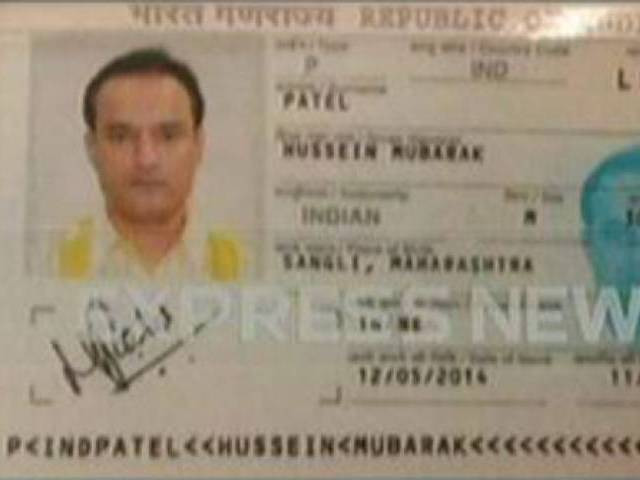Kulbhushan Jadhav’s case: Does international law protect spies?
Kulbhushan Jadhav is still a serving commander in the Indian navy

PHOTO: EXPRESS News screengrab
Indian spy admits RAW destabilising Pakistan
As a kneejerk reaction to the embarrassment, the Indian side is giving more talk time to push the notion that there is stiff homegrown resistance by “militants in Balochistan who are fighting for their rights in the face of decades of indifference.” By any standards, the media strategy is going to further add to tensions instead of helping control the damage inflicted on India and its prime agency, Research & Analysis Wing (RAW).
While rebutting the confessional video released two days ago, Delhi has demanded ‘consular access to the India businessman’. It is reliably learnt that the Pakistan high commission in Delhi has received no paperwork from India’s ministry of external affairs.
In his own words, Kulbhushan Jadhav is still a serving commander in the Indian navy, thus the man is the senior most person arrested on espionage charges.
Given the nature of bilateral relations, Pakistan and India are expected to have elaborate spying webs in each other’s territory. While espionage helps thwart enemy designs, often the information gained helps reduce fear of the enemy which is otherwise based in religious or ideological hatred and historical experience. However, consular access is not granted to foreigners when arrested on charges of spying and subversive activities.
Last November, Delhi claimed that Uttar Pradesh police have arrested a low ranking ISI agent, Mohammad Kalam alias Mohammad Ejaz. In the fashion similar to Jadhav’s arrest, RAW too released his photo, Indian ID card and also the Pakistani CNIC. Neither Pakistani high commissioner in Delhi was summoned for protest nor Islamabad sought consular access for its citizen. The same has been a usual practice whenever either side got their hands on a spy.
India rejects ‘tutored’ spy confession
In the most recent case, however, India is trying to sell its version of an Indian businessman abducted by extremists and being portrayed as a spy. Iran has yet to deny validity of Iranian visa for Hussein Mubarak Patel. Pakistan is sending a detailed dossier with all relevant queries and information. Tehran can delay but will have to articulate its position on the matter. Despite closer security and economic ties with
India, Iran is less likely to term his Iranian visa as fake. It's likely to maintain silence but exercise greater caution in facilitating its ally.
Similarly, India did not own its citizen and a low level RAW operative, Hamid Nehal Ansari, who was jailed for three years by a military court. The man entered Pakistan's Kohat region illegally from Afghanistan in 2012. Though no consular access was sought for Hamid the Indian media interviewed his family repeatedly to establish that he may have strayed into Pakistan. He is serving his prison term announced in February.
Delhi never sought consular access for Sarabjit Singh when he was arrested and his Indian nationality was claimed by Islamabad. The asset was probably too insignificant for RAW to press the MEA. However, Delhi announced three-day mourning over Sarabjit Singh's death while announcing a compensation of INR10 million for his family.
Unless Pakistan has enough proof to establish Kulbhushan Jadhav as an unlawful combatant, India can exercise legal instruments to assist its citizens. However, background interviews indicate that Islamabad has all sufficient evidence to prove its case in any court of law.
Analysis: Kulbhushan Jadhav’s RAW move
According to Article 29 of customary International Humanitarian Law, “A person can only be considered a spy when, acting clandestinely or on false pretences, he obtains or endeavours to obtain information in the zone of operations of a belligerent with the intention of communicating it to the hostile party." If Pakistan can sufficiently establish through proof that the Jadhav is a spy then his rights for consular access are automatically forfeited. No country has the right to treat unlawful combatants or spies inhumanely.
Article 30 of the same law states, “A spy taken in the act shall not be punished without previous trial.” India and Pakistan have been trying spies in military courts. The sentences have been rarely challenged in the Supreme Court. More recently, India has been exerting civil society pressure on the pretext of humanitarian grounds. In one case, an attempt was made to shield a convicted spy as a case of mistaken identity.
In the case of Jadhav, Islamabad is unlikely to budge given the ‘evidence’ of Indian support for terrorism in Balochistan and Karachi, which adds up in the statement of Premier Modi in Bangladesh of severing East Pakistan and then by those of his defense minister Manohar Parrikar and Ajit Doval, advisor on national security.
Pakistan is collecting evidence to prove India is a direct sponsor of terrorism. The espionage games have taken a different turn and there’s more drama ahead.
Naveed Ahmad is a Pakistani investigative journalist and academic with extensive reporting experience in the Middle East and North Africa. He is based in Doha and Istanbul. He tweets @naveed360



















COMMENTS
Comments are moderated and generally will be posted if they are on-topic and not abusive.
For more information, please see our Comments FAQ